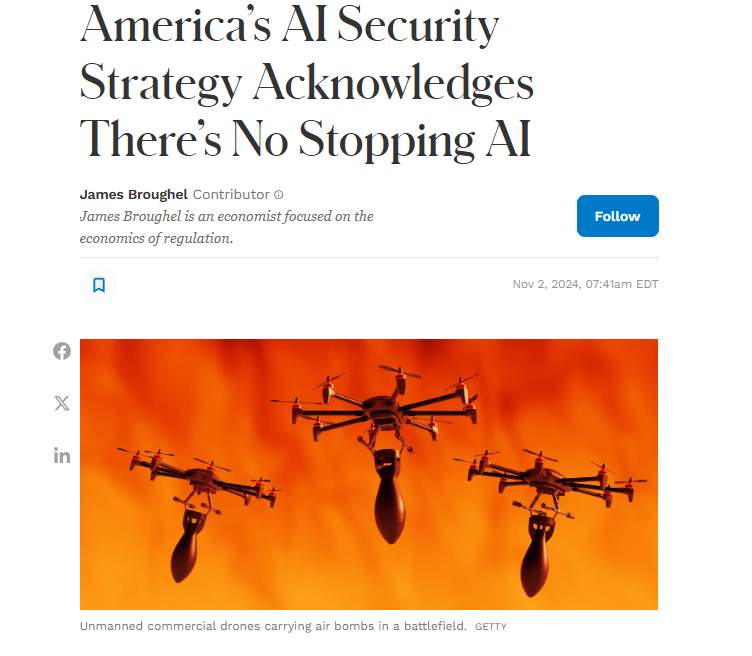
November 2, according to the foreign media forbes report, late last month, theBiden AdministrationFirst report onAI's national security memo reveals something important: the government's acquiescence to the development of AI is not only important to theUSANational security is critical and unstoppable. The memo does not call for a "pause" or slowdown in AI development, but rather focuses on how to support and protect the U.S. AI infrastructure.
Perhaps most telling is the memo's reference to meeting the huge energy needs of AI. Advanced AI models require enormous computing power, which translates into massive energy consumption. Rather than seeing this as a reason to limit AI development, the U.S. government is quietly planning for it, proposing to expand renewable energy to support AI data centers. An AI Data Center Infrastructure Working Group has even been created to specifically streamline the permitting process for new data centers, with a focus on renewable energy integration.
This is not the approach of an administration that believes that AI development can or should be halted. Rather, it is a pragmatic recognition that advances in AI will continue, and that the role of the United States should be to shape and ensure its development, not to try to stop it.
The memo also discusses the dual use of AI - its potential for both beneficial and harmful applications in both the military and civilian spheres. It focuses on practical measures such as cybersecurity testing of AI models and strengthening U.S. semiconductor production.
Supply chain security is given a high priority in the memorandum, with the Departments of Commerce, Defense, and other federal agencies responsible for identifying and addressing vulnerabilities. This action builds on laws such as the CHIPS Act of 2022, which aims to boost domestic semiconductor production.
The memorandum also recognizes the benefits of AI for national security, particularly in intelligence gathering and military applications. This recognition of the critical role of AI in national defense further solidifies its status as a technology that will continue to evolve, regardless of one's need for caution or deferral.
Taken together, the Biden administration has sent a clear message that AI development is indisputable, and that the United States' top priority should be to maintain its leadership in this area while controlling risks. This is in stark contrast to those calling for a freeze on development or a long-term moratorium on advanced AI research.
While the memo presents a pragmatic framework for managing the growth of AI, translating these policies into effective action will require sustained commitment and resources. The greatest threat to U.S. security interests is not advances in AI technology - that is inevitable. The real danger lies in failing to prepare for and adapt to the changes that AI will bring, especially if the United States lags behind other countries or malicious actors in terms of AI capabilities and infrastructure.
The memorandum's focus on building infrastructure rather than restricting development represents a mature approach to AI governance. Rather than futilely trying to halt progress, the administration is focused on shaping the future of AI to ensure it serves U.S. interests and values. This marks a modest but significant shift in the conversation around AI. The focus is no longer on debating whether AI should advance, but rather how to advance AI responsibly and safely.
For those worried about the rapid advancement of AI, the National Security Memorandum on Artificial Intelligence makes it clear that the development of AI will continue, and that our energies are better spent on ensuring its safe development rather than trying to stop it altogether.